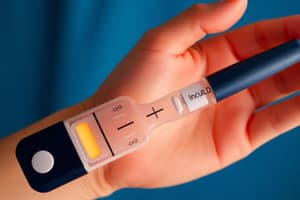Podcast
Questions and Answers
What is the main characteristic of type 1 diabetes?
What is the main characteristic of type 1 diabetes?
- Destruction of pancreatic beta cells (correct)
- Inflammation of pancreatic alpha cells
- Impaired glucose uptake
- Overproduction of insulin
What is thought to contribute to the destruction of beta cells in type 1 diabetes?
What is thought to contribute to the destruction of beta cells in type 1 diabetes?
- Hormonal imbalance
- Genetic, immunologic, and environmental factors (correct)
- Dietary factors alone
- Physical inactivity
What do people inherit that contributes to the development of type 1 diabetes?
What do people inherit that contributes to the development of type 1 diabetes?
- Pancreatic inflammation
- Genetic predisposition (correct)
- High blood sugar levels
- Insulin resistance
What abnormal response is seen in type 1 diabetes?
What abnormal response is seen in type 1 diabetes?
What have been detected in people at the time of diagnosis and even several years before the development of clinical signs of type 1 diabetes?
What have been detected in people at the time of diagnosis and even several years before the development of clinical signs of type 1 diabetes?
What is the role of human leukocyte antigen types in the development of type 1 diabetes?
What is the role of human leukocyte antigen types in the development of type 1 diabetes?
What continues to be investigated as potential initiators of beta cell destruction in type 1 diabetes?
What continues to be investigated as potential initiators of beta cell destruction in type 1 diabetes?
What is the primary target of the autoimmune response in type 1 diabetes?
What is the primary target of the autoimmune response in type 1 diabetes?
What is the role of endogenous insulin in type 1 diabetes?
What is the role of endogenous insulin in type 1 diabetes?
What is the evidence of an abnormal response in type 1 diabetes?
What is the evidence of an abnormal response in type 1 diabetes?
What is the recommended daily minimum of carbohydrates for women with gestational diabetes?
What is the recommended daily minimum of carbohydrates for women with gestational diabetes?
What percentage of women with gestational diabetes can control blood glucose levels with lifestyle modifications alone?
What percentage of women with gestational diabetes can control blood glucose levels with lifestyle modifications alone?
What is the target range for blood glucose levels during pregnancy for women with gestational diabetes?
What is the target range for blood glucose levels during pregnancy for women with gestational diabetes?
How often should women with a history of gestational diabetes be screened for the development of diabetes or prediabetes?
How often should women with a history of gestational diabetes be screened for the development of diabetes or prediabetes?
What should women at high or average risk for gestational diabetes have if they exceed the glucose threshold value of 140 mg/dL (7.8 mmol/L)?
What should women at high or average risk for gestational diabetes have if they exceed the glucose threshold value of 140 mg/dL (7.8 mmol/L)?
What is the first step in the initial management for women at high or average risk for gestational diabetes?
What is the first step in the initial management for women at high or average risk for gestational diabetes?
What is the glucose threshold value that triggers further testing for women at high or average risk for gestational diabetes?
What is the glucose threshold value that triggers further testing for women at high or average risk for gestational diabetes?
What is the percentage of women who usually see their blood glucose levels return to normal after delivery?
What is the percentage of women who usually see their blood glucose levels return to normal after delivery?
What is the recommended daily minimum of protein for women with gestational diabetes?
What is the recommended daily minimum of protein for women with gestational diabetes?
What is the recommended daily minimum of fiber for women with gestational diabetes?
What is the recommended daily minimum of fiber for women with gestational diabetes?
What is the main cause of hyperglycemia in type 1 diabetes?
What is the main cause of hyperglycemia in type 1 diabetes?
Which syndrome may result from insulin resistance in type 2 diabetes?
Which syndrome may result from insulin resistance in type 2 diabetes?
What is a risk factor for gestational diabetes?
What is a risk factor for gestational diabetes?
What is the recommended timing for screening gestational diabetes in high-risk women?
What is the recommended timing for screening gestational diabetes in high-risk women?
Which condition may result from type 2 diabetes but not typically from type 1 diabetes?
Which condition may result from type 2 diabetes but not typically from type 1 diabetes?
What contributes to hyperglycemia in type 1 diabetes?
What contributes to hyperglycemia in type 1 diabetes?
What is the main cause of hyperglycemia in type 2 diabetes?
What is the main cause of hyperglycemia in type 2 diabetes?
What is a long-term complication that may occur before the diagnosis of type 2 diabetes?
What is a long-term complication that may occur before the diagnosis of type 2 diabetes?
What causes fluid and electrolyte loss in diabetes?
What causes fluid and electrolyte loss in diabetes?
What leads to diabetic ketoacidosis (DKA) in type 1 diabetes?
What leads to diabetic ketoacidosis (DKA) in type 1 diabetes?
Study Notes
Understanding Diabetes: Types and Complications
- Destruction of beta cells leads to decreased insulin production and increased glucose production by the liver, resulting in hyperglycemia.
- Excess glucose in the blood can lead to glycosuria and osmotic diuresis, causing fluid and electrolyte loss.
- Insulin deficiency leads to unrestrained glycogenolysis and gluconeogenesis, contributing to hyperglycemia, and increased ketone body production, leading to diabetic ketoacidosis (DKA).
- Type 2 diabetes is more common in older individuals and those with obesity, but its incidence is increasing in younger individuals due to the obesity epidemic.
- Insulin resistance and impaired insulin secretion are the main issues in type 2 diabetes, leading to elevated glucose levels.
- Insulin resistance may also result in metabolic syndrome, characterized by symptoms like hypertension and hypercholesterolemia.
- Type 2 diabetes does not typically lead to DKA but may result in hyperglycemic hyperosmolar syndrome (HHS).
- Type 2 diabetes onset may go undetected for many years, leading to long-term complications before diagnosis.
- Gestational diabetes occurs during pregnancy due to insulin resistance from placental hormones.
- High-risk groups for gestational diabetes include those with obesity, a history of gestational diabetes, or a strong family history of diabetes.
- Women at high risk should be screened for gestational diabetes at their first prenatal visit and between 24 and 28 weeks of gestation if initially negative.
- All women of average risk should be tested for gestational diabetes at 24 to 28 weeks of gestation.
Studying That Suits You
Use AI to generate personalized quizzes and flashcards to suit your learning preferences.
Related Documents
Description
Test your knowledge of diabetes types and complications with this quiz. Explore topics such as insulin production, hyperglycemia, diabetic ketoacidosis, type 2 diabetes, gestational diabetes, and screening recommendations for high-risk groups.




